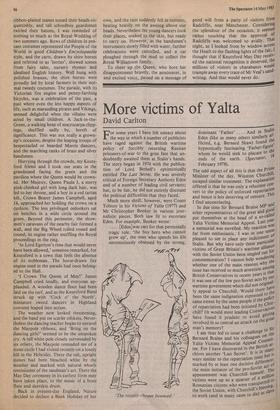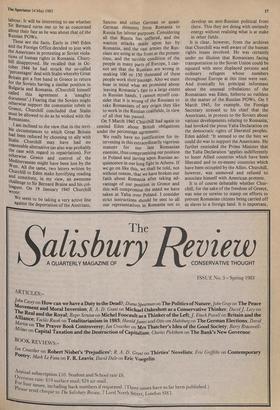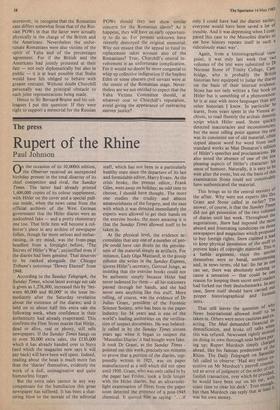More victims of Yalta
David Carlton
For some years I have felt uneasy about 1' the way in which a number of publicists have raged against the British wartime policy of forcibly returning Russian prisoners-of-war to the grim fate that un- doubtedly awaited them at Stalin's hands. The story began in 1974 with the publica- tion of Lord Bethell's optimistically entitled The Last Secret. He was severely critical of Foreign Secretary Anthony Eden and of a number of leading civil servants; but, to be fair, he did not entirely discount the political difficulties that they faced.
Much more shrill, however, were Count Tolstoy in his Victims of Yalta (1977) and Mr Christopher Booker in various jour- nalistic pieces. Both saw fit to excoriate Eden. For example, Booker wrote:
[Eden]was cast for that perennially tragic role, 'the boy hero who cannot grow up', the man who spends his life unconsciously obsessed by the strong,
'The royalty cheque bounced.'
dominant 'Father' .... And in Stalin Eden (like so many others similarly af- flicted, e.g. Bernard Shaw) found the hypnotically fascinating 'Father -figure' whom he would seek to placate to the ends of the earth. (Spectator, 18 February 1978).
The odd aspect of all this is that the Prime Minister of the day, Winston Churchill, escaped similar treatment. The explanation offered is that he was only a reluctant con- vert to the policy of enforced repatriation and hence is less deserving of censure. This I find unconvincing. In due time Sir Bernard Braine MP and other representatives of the great and goo' put themselves at the head of a so-called Yalta Victims Memorial Appeal. Last year a memorial was unveiled. My reaction was far from enthusiastic. I was in one sense,. pleased to see in place any indictment 0' Stalin. But why have only these particular victims of Great Britain's wartime alliance with the Soviet Union been singled not for commemoration? I cannot help wondering whether one of the main reasons why the issue has received so much attention arrong British Conservatives in recent years is that it was one of the few pro-Soviet acts by onr wartime government which did not original- ly appeal to Churchill. Would there have been the same indignation expressed to the soafmr ee peaxttreina tt iboyn thhaeds abme een ptenoupt al et ei df t bh ye pcohl Chur- chill? Or would most leading Conservatives have found it prudent to avoid getting involved in so central an attack on the great man's memory?
I am thus led to issue a challenge to•
Sir Bernard Braine and his colleagues on the Yalta Victims Memorial Appeal Commit- tee. For I have discovered in the Birtish ar- chives another 'Last Secret'. It is in tnans ways similar to the repatriation issue but ": marked by at least one decisive difference: the main initiator of the pro-Soviet act_. appeasement was Churchill himself. 111; victims were up to a quarter of a Milli% Romanian citizens who were transported E the Soviet Union, with Churchill's blessing, to work (and in many cases to die) as slave
labour. It will be interesting to see whether Sir Bernard turns out to be as concerned about their fate as he was about that of the Russian POWs.
These are the facts. Early in 1945 Eden and the Foreign Office decided to join with the e Americans in protesting at Soviet viola- tions of human rights in Romania. Churc- hill disapproved. He recalled that in Oc- tober 1944 he had struck the so-called 'Percentages' deal with Stalin whereby Great Britain got a free hand in Greece in return for the Soviets having a similar position in Bulgaria and Romania. (Churchill himself called this agreement a 'naughty document'.) Fearing that the Soviets might Otherwise support the communist rebels in Greece, Churchill concluded that Stalin must be allowed to do as he wished with the Romanians.
I an inclined to the view that in the terri- ble circumstances to which Great Britain had been reduced by choosing to ally with Stalin Churchill may have had no reasonable alternative (as also was probably the case with regard to repatriation). For Otherwise Greece and control of the Mediterranean might have been lost by the West. All the same, two letters written by Churchill to Eden make horrifying reading and constitute, in my view, an awesome Challenge to Sir Bernard Braine and his col-
leagues. On 19 January 1945 Churchill wrote: We seem to be taking a very active line against the deportation of the Austrians,
Saxons and other German or quasi- German elements from Romania to Russia for labour purposes. Considering all that Russia has suffered, and the wanton attacks made upon her by Romania, and the vast armies the Rus- sians are using at the front at the present time, and the terrible condition of the people in many parts of Europe, I can- not see that the Russians are wrong in making 100 or 150 thousand of these people work their passage. Also we must bear in mind what we promised about leaving Romania's fate to a large extent in Russian hands. I cannot myself con- sider that it is wrong of the Russians to take Romanians of any origin they like to work in the Russian coalfields, in view of all that has passed.
On 5 March 1945 Churchill had again to remind Eden about British obligations under the percentage agreement:
We really have no justification for in- tervening in this extraordinarily vigorous manner for our late Romanian enemies, thus compromising our position in Poland and jarring upon Russian ac- quiescence in our long fight in Athens. If we go on like this, we shall be told, not without reason, that we have broken our faith about Romania after taking ad- vantage of our position in Greece and this will compromise the stand we have taken at Yalta over Poland. I consider strict instructions should be sent to all our representatives in Romania not to
develop an anti-Russian political front there. This they are doing with untimely energy without realising what is at stake in other fields.
It is clear, however, from the archives that Churchill was well aware of the human rights issues involved. He was certainly under no illusion that Romanians facing transportation to the Soviet Union could be equated with mere displaced persons and ordinary refugees whose numbers throughout Europe at this time were vast. And ironically his principal informant about the unusual tribulations of the Romanians was Eden, hitherto so ruthless in the matter of the Russian POWs. On 5 March 1945, for example, the Foreign Secretary stressed to his chief that the Americans, in protests to the Soviets about various developments relating to Romania, had invoked the pious Yalta Declaration on the democratic rights of liberated peoples. Eden added: 'It seemed to me the best we could do was to support the Americans. He further reminded the Prime Minister that the Yalta Declaration 'applies indifferently to lesser Allied countries which have been liberated and to ex-enemy countries which have been occupied by the Allies. Churchill, however, was unmoved and refused to associate himself with American protests.
It is of course debatable whether Chur- chill, for the sake of the freedom of Greece, was wise or unwise to stamp on efforts to prevent Romanian citizens being carried off as slaves to a foreign land. It is important, moreover, to recognise that the Romanian case differs somewhat from that of the Rus- sian POWs in that the latter were actually physically in the charge of the British and the Americans. Nevertheless the unfor- tunate Romanians were also victims of the spirit of Yalta and of the percentages agreement. For if the British and the Americans had jointly protested at their fate — not only diplomatically but also in public — it is at least possible that Stalin would have felt obliged to behave with greater restraint. Without doubt Churchill personally was the principal obstacle to such joint representations being made.
Hence to Sir Bernar&Braine and his col- leagues I put this question: If they were right to support a memorial for the Russian
POWs should they not show similar concern for the Romanian slaves? As it happens, they will have an early opportuni- ty to do so. For persons unknown have recently destroyed the original memorial. Why not ensure that the appeal to fund its replacement takes account also of the . Romanians? True, Churchill's central in- volvement is an unfortunate complication. For it would no doubt be more congenial to whip up collective indignation if the hapless Eden or some obscure civil servant were at the centre of the Romanian stage. Never- theless are we not entitled to expect that the Yalta Victims Committee should, at whatever cost to Churchill's reputation, avoid giving the appearance of embracing uneven justice?












































 Previous page
Previous page